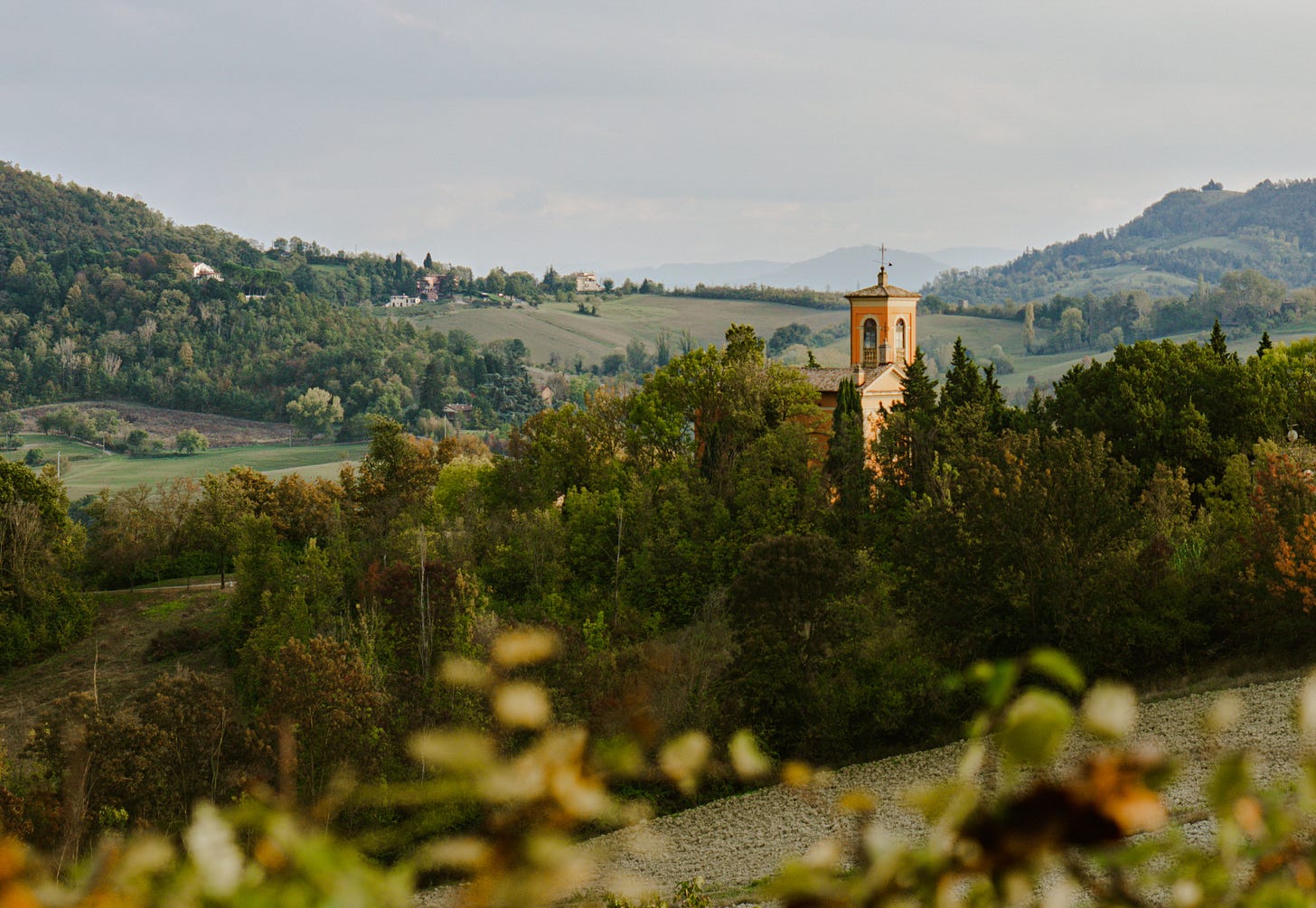On Being a Natural Theologian
After plumbing the depths of theology, the gospel remains the same. The real theological work is to persuade the natural man that the content of Christianity coheres with the world we see around us.
If you’re reading this, there’s a good chance you subscribe to this newsletter, “The Natural Theologian.” Some of you subscribed very recently; others may not yet have subscribed. But all of you may be asking the question, “What is a natural theologian? And why does Joel describe himself as one?”
There is no reason to delay in answering your question: A natural theologian is a theologian who primarily explores what can be known of God, morality, and true religion from nature alone and apart from Scriptural revelation.
This task has fallen on hard times. Secular thinkers think that the project of natural theology, which they think of more narrowly as providing arguments for God’s existence, is futile and maybe impossible. Christian thinkers argue that it concedes too much to secularists and naturalists, who believe that nature is independent of God.
But I would argue that no task is more urgent than that of natural theology. If observation of the world yields no knowledge of God, morality, or true religion, then Christians have nothing to say to non-Christians to persuade them of the purportedly true religion. Worse, if nature does not reveal God, then what reason is there to think that God exists, much less that he became man and died for our sakes?
So, a natural theologian I aspire to be. And “The Natural Theologian” remains the title of this newsletter.
But so many questions remain: Working on a philosophy Ph.D., isn’t Joel a philosopher? Does this mean that Christianity can be known by reason alone? Is Joel denying the sufficiency and necessity of Scripture? In the rest of this post, I’ll answer these questions and lay the groundwork for the next season of “The Natural Theologian.” Thank you for reading.
Why “Theologian,” and not “Philosopher?”
In naming my newsletter, I chose a title that represents what I aspire to be as an intellectual. Even as I formulated the title, that aspiration came into focus. After my seminary degree, my academic focus shifted from theology to philosophy, and I began to aspire to be, not primarily a theologian, but a philosopher. I did not intend to abandon my Christian faith nor its centrality to my thinking, but only to shift my academic discipline from theology to philosophy.
However, in the public intellectual realm, where Substack lies, my role is best described, not as that of a philosopher, but of a theologian. The philosophers I admire and from whom I have learned most think in a way that is “bottom-up.” They do not begin with religious commitments but demonstrate their utility or attractiveness and gradually shift towards at least sympathy with the faithful. Among these, I think of Roger Scruton, Ludwig Wittgenstein, Jordan Peterson, and Paul Kingsnorth, prior to his conversion. The theology in which I had been trained articulated well the content of Christian belief; but it was these thinkers who best recommended that belief to others.
But, as a Christian, I cannot serve the same intellectual role as these philosophers. These thinkers’ credibility comes from their intellectual independence of each religious tradition. If Jordan Peterson, for example, professed Christian faith today, he would continue to have intellectual influence outside of Christendom only briefly. For a couple of months, he would explain to the media his reasons for moving in a direction that guaranteed his own obsolescence. Within six months, he would be a fixture primarily of Christian media, detailing his conversion. After a year, he would be confined to Christian media and have ceased to be more broadly relevant. A version of this has already occurred with Peterson’s alliance with the American political right.
Accordingly, for better or worse, to the public, a Christian intellectual is a theologian and not a philosopher.
How then to describe my commitment to doing theology in a way that is informed by and continuous with philosophy?
The phrase that came to mind was, “The Natural Theologian.” Natural theology, traditionally, was the task of demonstrating the existence of God from nature. At times, it has included the attempt to have a religion within the bounds of reason alone, excluding so-called “supernatural theology.” But generally, it has been the task of stating and demonstrating what Thomas Aquinas called the “preambles of faith,” that which can be known of God and the Christian religion without special, Scriptural revelation.
The preambles of faith include the existence of God, the nature and goodness of the created order, the moral law, and the sin and misery of our condition. In a common theological schema, “Creation” and “Fall,” but not “Redemption” and “Consummation,” belong to the province of natural theology. These are presupposed by the specifically Christian message of the gospel, delivered by special, supernatural revelation.
Without recognition of the preambles of faith, in some manner, the Christian religion does not make sense. Apart from these truths, Christianity offers the love of God who is not known to exist, forgiveness for sins we do not believe we have committed, and escape from a condition we had not recognized to be as tragic as it is. The preambles of faith are preparatory to the gospel because they acquaint us with our need for salvation of the kind Christ offers.
I was recently interviewed about being a natural theologian on the podcast Communion and Shalom: Weigh and Consider the World: Joel Carini on Nature, Truth, and Side B.
I was also recently interviewed by philosophy Samuel Barnes on theistic evolution: Mutually Assured Conversation #21: Theistic Evolution with Joel Carini.
The Method of Natural Theology
The task of a natural theologian is also differentiated by its method. Contemporary evangelical theology operates primarily by deduction from biblical premises, which are assumed to be indubitably true. The force of any statement in theological discourse is determined by the strength of its proof texts, even if these proof texts are lengthy and developed in a canonical, biblical-theological way, with attention to historical context, et cetera.
The natural theologian rejects this method of theology. First of all, such theology has nothing to say to those who do not accept the biblical text as true in every proposition it affirms. This includes not only all non-believers but also a number of believers. Accordingly, such theology is intellectually insular and lacking in apologetic value.
Second, this method assumes that, without any other recourse, we already fully comprehend the content of each biblical statement. This assumption has already been challenged by those who urge attention to the historical context, noting that the biblical text was delivered by human authors within a certain historical context, in which words had certain meanings, place-names certain referents, and so on.
But there is so much more that is assumed in our comprehension of biblical statements. Biblical statements assume the basic human understanding of the world with which each person is, in the ordinary course of things, equipped. When the Bible speaks of a “donkey,” for example, it assumes our familiarity with that species. (This also means that the Christian does not have a “distinctively Christian” concept of a donkey, as I argued last week in “Christians and Non-Christians Use the Same Concepts.”) More generally, it assumes our knowledge of the physical and human environment which only the strictest Cartesian skepticism calls into question. Such knowledge does not have the Bible as its foundation but is epistemically prior to our knowledge from the Bible.
Third, this method also assumes that biblical statements have a quasi-magical character. Such statements are supposed to be the only firm foundation of knowledge, indubitably true, and different in character from all other statements. However, on the contrary, biblical statements are not magical. They are just as accountable to empirical reality as any other statements because they are about reality. The Bible refers to real people and places, and to the extent that these are knowable or verifiable by other means, its accuracy is confirmed or disconfirmed. To render the Bible immune to falsification is effectively to deny that it is about this world.
The contents of the book of Proverbs, for instance, are found in other ancient texts. According to the magical view, when stated by ancient sages, these statements were fallible. When transcribed into an Israelite scroll, they were inspired and infallible. On the contrary, when they were originally written, by prophet or not, they expressed wisdom concerning human life. In God’s providence, they were included in the biblical canon, in which they continue to express wisdom concerning human life, wisdom which, by the way, is not best expressed as propositional truth following the law of non-contradiction: “Answer a fool; don’t answer a fool.”
Confidence in the Bible generally must rely on non-biblical confirmation. We must discover, to the extent we can, that the Bible conforms to and speaks truth concerning the world we inhabit.
The task of summarizing and deducing from the Bible the unique content of Christian theology remains a valid one. However, there are hundreds, if not thousands of such theologians throughout evangelical institutions of higher education, not to mention Christian pulpits.
But there is a dearth of theologians operating in the way that I have described, concerning themselves with the preambles of faith, asking whether the Bible conforms to experience, and using non-deductive methods of philosophy and empirical investigation to explore the preambles of faith and produce from it a kind of informal natural theology. And even those who do perform this task do not see it as a unified discipline of this character.
The Limits of Natural Theology
I remember, shortly after I began hanging out with my now-wife, looking over her philosophy homework about Thomas Aquinas. The subject was the difference between the preambles of faith and the articles of faith. (Technically, they’re called “preambles to the articles of faith” - assistant to the regional manager). At the time, I was a committed presuppositionalist and so, I denied this distinction. Every truth - every truth - was an article of faith, dependent on Scriptural or supernatural revelation.
(I wrote an eBook detailing the 50 Errors of Christian Presuppositionalism if you want to learn more about what is wrong with that way of thinking.)
I repent of that error. Chesterton captured it when he said that the doctrine of original sin is one that you can prove empirically. Lewis demonstrated it when he began Mere Christianity from common human moral experience. Aquinas formulated it when he argued that we could know that God exists and is one in being or substance from reason, but that God is a Trinity required supernatural revelation.
I was guilty of an unbiblical biblicism. The Bible itself says that the existence of God and his invisible attributes are clearly seen in the things that have been made. Also, the moral law of God is written upon the heart. (Presuppositionalists have forced workarounds for these passages.)
What became even clearer to me over time was that the distinctive truths of the Christian religion are summed up in the body of information we call “The Gospel,” that Christ died and rose for our justification, together with the doctrinal truths of the Trinity and Incarnation that are revealed in that salvific event. For any non-Christian to hear and respond to this gospel, he had to be already acquainted with several things: The existence of God, the law of God, the moral responsibility of man, the inevitability of death, and human sin and misery. If someone doesn’t grasp all of these truths then the gospel offers salvation by a non-entity from a non-problem.
Two related objections immediately come: Don’t unbelievers suppress the truth in unrighteousness? And isn’t it, therefore, necessary to learn all of these truths from the Bible in order to know them aright? This is a misunderstanding. Unbelievers couldn’t suppress this body of truths if they weren’t already publicly available to all humans living in God’s world. This means that we need unbelievers to come to see clearly truths that are available to them and with which they are at some level already acquainted.
The Bible, too, will have the function of pointing us to truths that are available elsewhere. When the Psalmist and Paul quoting him say that “None is righteous, no, not one,” they are observing something, not magically revealing something previously unknown. The Bible’s moral instruction coheres with and makes explicit the moral fabric of human life and the ethical and legal structures that are just. (See C.S. Lewis’s catalog of human laws exemplifying the Tao throughout human civilizations, at the end of The Abolition of Man.)
At the same time, I am not advocating a religion within the bounds of reason or arguing that natural human knowledge suffices to know the truth of Christianity. Quite the contrary. Natural human knowledge can essentially acquaint us with the truths summarized in Christian theology under the headings of Creation and Fall. But the truths of Redemption and Consummation are particular to the gospel and require supernatural revelation. In emphasizing natural theology, then, I am not downplaying supernatural theology, only correcting the overemphasis on special revelation and denigration of natural theology that I have encountered.
As it happens, I think that the majority of creative and innovative theological work has to be on the level of natural theology. After plumbing the depths and climbing the heights of scholastic Reformed theology, I can report that the content of the gospel remains just the same, “Repent and believe in Christ for salvation.” The real theological work is to persuade the natural man that this good news is the answer to his condition and that the content of Christianity coheres with what we can see around us, summarizing and fulfilling it.
A Natural Style
There is one more facet to being a “natural theologian” that bears mentioning. A natural theologian is to be contrasted with an academic one. A natural theologian is not a writer of journal articles, but rather of essays, comprehensible by and directed toward the general public. The language of a natural theologian should be ordinary human language, without unnecessary technical terminology, which I will attempt to avoid. A natural theologian is one who demonstrates the relevance of what he says to the one to whom he says it. After all, what use is it to say what is irrelevant? Readers, I ask you to hold me accountable on this and to ask for clarification or the removal of jargon as necessary.
What’s Next for the Natural Theologian?
In the coming months, I plan to continue to write on a variety of subjects, sexuality, economics, evolution, each of which requires engaging with extra-biblical sources of information. These are subjects that weren’t covered in seminary, on which expertise in biblical exegesis cannot settle matters. You can also expect continued discussion of knowledge (epistemology) and theological and philosophical method.
But I hope to cultivate something even more: A model of thoughtful Christian engagement that avoids the errors of dogmatism - which often comes with being a theology nerd - and skepticism - which often comes with questioning the narrowness of Christian sub-cultures. As you read, perhaps “The Natural Theologian” will become too narrow, and “The Natural Theologians” will replace it. A new breed of Christian humanists, able in both supernatural and natural theology, engaged with the world not only to save it, but also to learn from it: That is the goal. Would you join me?
P.S. This newsletter owes its existence to Justin Murphy and his course “Indie Thinkers,” which taught me the path of an independent, Internet intellectual. I highly recommend Murphy’s latest eBook, “The Independent Scholar” and Other Life, the associated online community for independent intellectuals.












"Will you join me?"
Yes I will.
My conversion to Christianity came at the end of a season of my life that was, in any metric, an utter disaster. Married at 17 to a pregnant girlfriend, with the child passing away at three months old on my watch. The marriage lasted a couple of years beyond that as we both descended into the popular lifestyle of being hippies. Drug use and alcohol were in abundance, as was the adultery (on my part) of the “free love” worldview. Ultimately, at the explosive end of that, I spend a year as a homeless man, steeping in the tea of my guilt over all this.
You said, "For any non-Christian to hear and respond to this gospel, he had to be already acquainted with several things: The existence of God, the law of God, the moral responsibility of man, the inevitability of death, and human sin and misery. “ It occurs to me that when I stood at the front of a church after an altar call, I stood there with all those ideas intact, or, at least, in one great and desperate hope that they are. Frankly, having lost any connection to hope for redemption of my load of guilt in the death of my son and for the rest of my very poor choices along the way, If this promised Jesus was not real, I was utterly done. So, in many ways, I stood there with a Christian worldview (though not an intentionally biblical one) It could be said I had a natural theology, having been brought to me outside of the pages of scripture but a clear divine revelation, nonetheless.
Moving the story ahead from that October day in 1975, it took me 20 years (I confess with some embarrassment) to come to a place that was some distance from the “biblicalism” that you mentioned above. Biblicalism was just not doing it for me anymore, as I observed the repeated appeal from the pulpit for the building of some emotional response to Jesus. I finally came to the conclusion that God was a rational Being, and we should have more of that approach. All objective Truth is God’s Truth, and we should try to seek out God with a more rational faith. I committed myself to the pursuit of real Truth, regardless of where it would take me. Christianity cannot be true because it is Christianity but because it is true.
That led me to the study of apologetics. Let’s first dispel the faulty ideas about apologetics The study of apologetics is not a pathway for Christians to win a debate and crush the worldviews of our opponents. You mentioned Aquinas and his “preambles of faith.” Apologetic pursuits are the quest for tools to provide these preambles of faith. I use the term “pre-evangelism.” That is possibly because I am less of an academic, having spent my career as a God-serving construction tradesman, and may be short on the lexicon of academia.
I have said all that wordiness to say I am with you as a natural theologian. I continue to be amazed at the complexity of our natural world. Observing the systems of systems functioning all around us is not, as some would say, an exercise in pareidolia, seeing patterns in the chaos which are not there. Denying that hand of a rational Creator requires a constant invocation of deeply committed a priori mental gymnastics. Though I may not be formally educated, I have spent almost 50 years in the “School of the Holy Spirit” and can tell you the information-cum-knowledge is the same stuff. God truly is good!